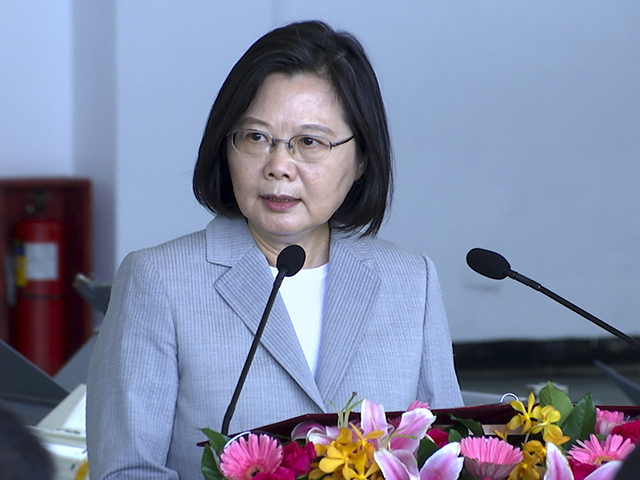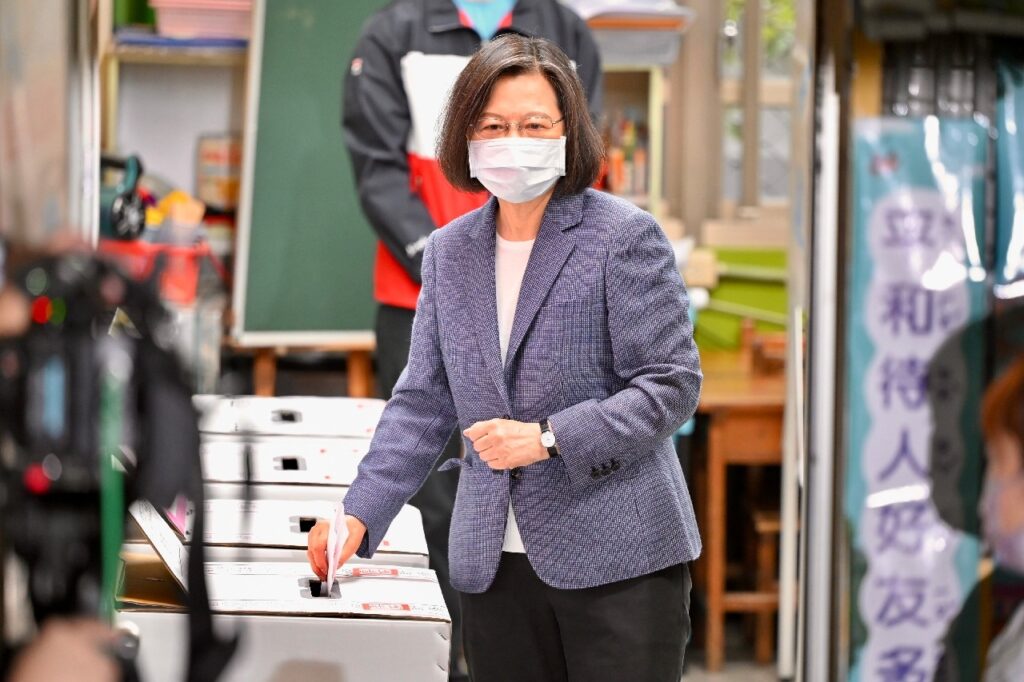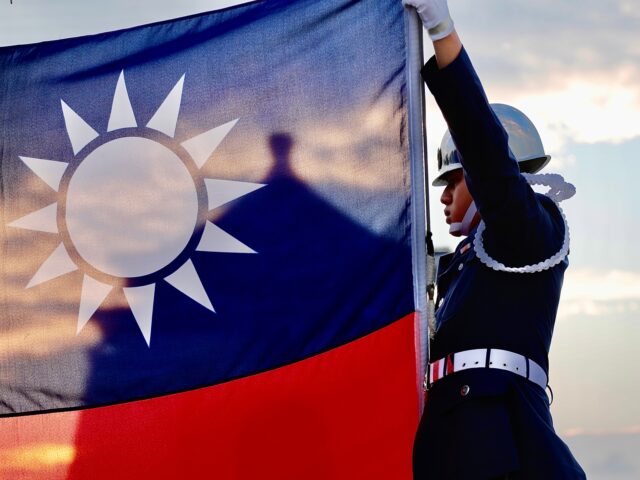Chinese state media on Monday celebrated the party of Taiwanese President Tsai Ing-wen faring poorly in local elections against candidates from the more Communist-friendly Kuomintang party (KMT), gloating that Tsai’s effort to capitalize on public apprehension over the threat from mainland China had “backfired.”
China’s state-run Global Times hooted at Tsai for losing with her “China threat bet,” quoting smug Chinese officials who said the results “proved mainstream public opinion on the island was for peace.”
The Global Times also cast the results as a rejection of Tsai and the Democratic Progressive Party (DPP) for poor governance and corruption:
Wang Jianmin, a senior cross-Straits expert at Minnan Normal University in East China’s Fujian Province, told the Global Times on Sunday that the DPP has lost people’s support because of its failures in handling many internal affairs concerning public livelihoods and frequent scandals violating “values” it boasted about.
Corruption, black gold politics and nepotism severely violated what the DPP had pledged to the people, Wang said, and he cited in particular the academic integrity scandal of ex-Hsinchu mayor Lin Chih-chien.
Lin’s degree and diploma were revoked by the Chung Hua University for serious plagiarism in his master’s thesis, the island’s media reported in August. Though Lin later quit the election for Taoyuan, the scandal “severely frustrated the young generation, DPP’s traditional vote base” and the new candidate was seen to be “in same camp of Lin” and lost political integrity, Wang said.

Taiwan President Tsai Ing-wen speaks during a visit to the Penghu Magong military air base in outlying Penghu Island, Taiwan Tuesday, Sept. 22, 2020. (AP Photo/Johnson Lai)
Wang also faulted the DPP for not doing enough to protect the Taiwanese economy from disruptions caused by the Russian invasion of Ukraine and suggested young Taiwanese voters were turned off by proposals to extend the length of mandatory military service.
The South China Morning Post (SCMP) was unsurprised Beijing would celebrate and politicize the results, which saw DPP suffering “its worst defeat in 36 years” while KMT won in the capital city of Taipei, three important municipalities, and “nine other smaller cities and counties on the island.”
“Analysts said the KMT’s gains were less of a win for the party and more of a vote of disapproval for the government, including failures to handle [Chinese coronavirus], unemployment and business shutdowns,” the SCMP noted.
Taiwan was applauded for an exemplary response to the Chinese coronavirus in the early days of the pandemic, but later had difficulty securing vaccines, resulting in higher rates of infections and fatalities as the later, more contagious coronavirus variants spread.
Some analysts thought KMT would be revitalized by its strong showing and mount a credible challenge to Tsai in the 2024 presidential election, while others thought KMT would continue to suffer from potentially “unmanageable” infighting, the lack of a unifying party candidate, and the possibility that Tsai might improve her performance and turn DPP’s public image around.
On the other hand, Alex Lo of the Taiwan International Strategic Study Society in Taipei suggested Tsai would back down from confrontations with Beijing because DPP’s poor showing in the 2022 election would rattle her confidence.
“The KMT has diluted its position but is traditionally known as a pro-mainland China party so the outcome of Saturday’s polls should be welcomed by Beijing, given it would rather have the party win than to see a victory for the pro-independence DPP,” Lo said.
After the KMT’s big win was confirmed on Saturday, Tsai immediately resigned as chairwoman of the DPP. Premier Su Tseng-chang, a senior member of the party, also tendered his resignation, although Tsai asked him to remain in office for the time being.
“The results failed our expectations. We humbly accept the results and accept the Taiwanese people’s decision,” Tsai said.

Taiwan’s President Tsai Ing-wen drops her ballot as she votes at a polling station during the mayoral elections in New Taipei City on November 26, 2022. (Photo by SAM YEH/AFP via Getty Images)
“It’s not like the DPP has never failed before. We don’t have time to feel sorry. We fell, but we will stand up again,” Tsai told reporters, alluding to a previous election disappointment in 2018 and her subsequent resignation as party chair.
The Taipei Times post-election analysis on Monday suggested KMT was reading too much into an election where it benefited greatly from public discontent with Tsai — but other opposition parties also did well, including the rising Taiwan People’s Party (TPP).
The Taipei Times described KMT as a “tree with a weak trunk and strong branches,” because some of its successful candidates were individually popular or charismatic, but their influence might not translate to the party at large.
Focus Taiwan likewise thought voters wanted to “teach the DPP a lesson,” but have not necessarily fallen in love with Kuomintang, or for that matter with Beijing.
A panel of Chinese dissidents visiting Taiwan after the election cautioned its voters not to trust the Chinese Communist government or to accept the notion that Taiwan is wholly responsible for securing peaceful relations by promoting “cross-strait dialogue.”
The dissident panel, like many Taiwan observers living abroad, noted that for all of the boasts about repudiation of DPP policies by KMT politicians and Chinese media, the midterm election was not really about cross-strait policy.
“In my view, the outcome of these elections is not a barometer of the January 2024 presidential election,” Bonnie Glaser of the German Marshall Fund in Washington told Focus Taiwan.
Political science professor Shelley Rigger of Davidson University added that KMT has more work to do before it can convince hesitant voters the party is not “Beijing-leaning,” while Tokyo University of Foreign Studies professor Yoshiyuki Ogasawara thought DPP sabotaged itself with some dubious candidate choices in the local election.

COMMENTS
Please let us know if you're having issues with commenting.